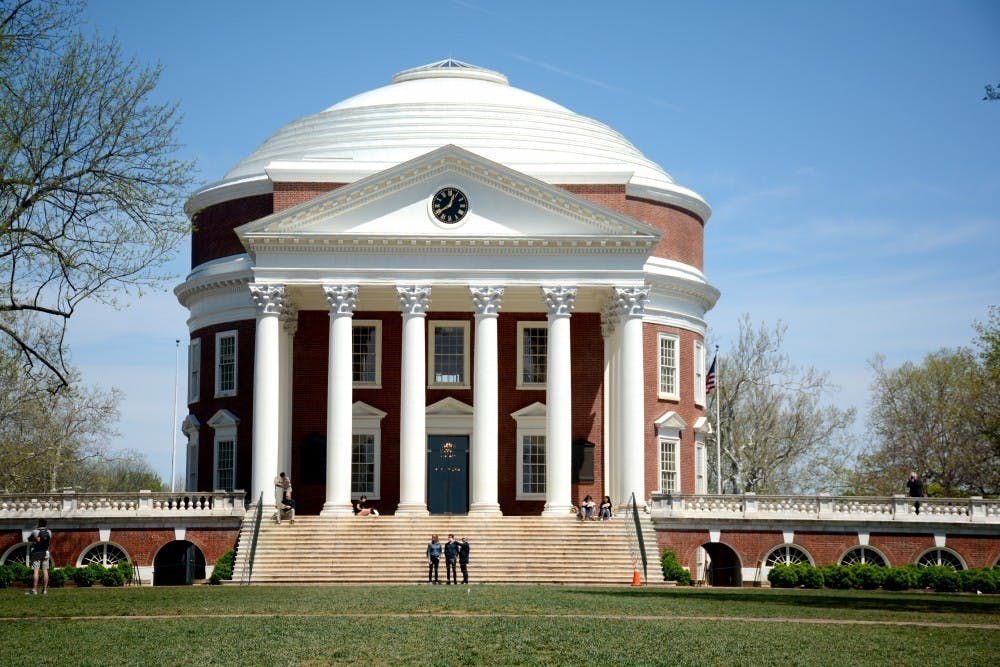The Student Council voted to pass two resolutions Tuesday night — SR21-06, A Resolution in Support of DivestUVA’s letter to the Board of Visitors and President, and SB21-07, A Resolution Denouncing Harassment Against Members of the Student Body. The meeting was also briefly Zoom-bombed by individuals unaffiliated with the University.
SR21-06 calls for the University of Virginia Management Company — the organization that invests the endowment and other long-term funds held by the University and its associated organizations — to divest from fossil fuels and reinvest those funds in more sustainable ventures and expresses support for DivestUVA’s initiative to end the University's use of fossil fuels by 2030. The resolution also calls on the University to “enter into divestment negotiations with the student body” and to publicly commit to the cause before the end of the spring semester.
SR21-06 was sponsored by third-year College student Mehdy Elouassi, third-year College student Abel Liu, fourth-year Batten student Quentin Milligan and first-year College student Emma Damazo.
“Climate change poses an existential threat to not only the U.Va. and Charlottesville communities, but global societies and disproportionately affects Black and Indigenous populations,” the resolution read. “U.Va. has a responsibility to align its investments with its publicly acclaimed values, including minimizing its carbon footprint in all spheres of influence.”
SR21-06 was passed with 16 members voting for the resolution and six members abstaining from voting.
The meeting was then briefly Zoom-bombed by several unauthorized individuals unaffiliated with the University, who used racist language and sexually inappropriate behavior. The meeting was interrupted three times before representatives agreed to call a brief recess.
Noah Strike, director of University relations and third-year College student, said that several individuals interrupted the meeting despite a number of security features already in place.
“A number of unauthorized and non-University affiliated individuals — mostly random internet trolls — joined the meeting and sporadically began to interrupt our members that were speaking, send racist chat messages and expose themselves on camera,” Strike said.
Student Council later shared a new Zoom link with increased security measures — including requiring the host to approve guests, limiting the chat function and blocking the ability of participants to unmute voluntarily — and apologized in a tweet.
“We sincerely apologize for the interruptions, and unequivocally condemn the language used and images posted,” the statement read. “We will be forwarding the relevant evidence to the appropriate University authorities.”
Strike said that Student Council will continue to look for possible solutions and investigate further.
This was not the first time that a Student Council meeting has been interrupted by Zoom-bombers — a virtual town hall in May was also Zoom-bombed by several individuals who bombarded the call with racist slurs.
The representative body then entertained SR21-07, a resolution sponsored by first-year College student Nickolaus Cabrera.
Cabrera’s legislation attempted to address several threats made against Young Americans for Freedom after a number of its members expressed support for Supreme Court Justice Amy Coney Barrett on social media during her nomination process. Cabrera said the resolution was intended to denounce social media harassment, develop more clarity when reporting incidents through Just Report It — the University’s online system for reporting sexual assault, discrimination, harassment and hazing — and to devise a better allocation of ambassadors through Grounds. According to Cabrera, a sign in support of Coney Barrett posted in the amphitheater was torn down by a student, who was caught on video.
The resolution was ultimately unsuccessful and the representative body instead voted to pass a substitute piece of legislation introduced by third-year College student Ryan Alcorn — SB21-07: A Resolution Denouncing Harassment Against Members of the Student Body.
Many representatives, including Alcorn, objected to SR21-07 on the grounds that it focused mainly on condemning threats made against Young Americans for Freedom.
“Representative Cabrera neglects to mention the very public fact of threats made against members of this very body,” Alcorn said. “If we want this to be cohesive legislation, we need to address the fact that this is a wide-reaching issue and does not pertain to one individual organization.”
Alcorn’s legislation, SB21-07, acknowledged that while all students at the University enjoy the right to express their own beliefs, students of all political affiliations have recently reported receiving threats. Alcorn’s resolution denounces these threats, along with illegal property removal, and calls on the University to protect all members of the community against harassment.
“The Student Council Representative Body calls on the University to protect community members against harassment.” the resolution reads. “We demand more clarity and promptness around Just Report It at U.Va. as well as social media harassment and cruelty policies.”
This is Student Council’s second condemnation of threats and harassment directed toward its members in the last four months. Following the harassment of several members of the legislative body after a November meeting was shared widely on social media, Student Council’s Executive Board released a statement condemning threats of violence made against members.
“The Executive Board fully condemns all threats of violence against any community member, regardless of their political affiliation,” the statement said. “Any threats of violence, from any individual or group, are completely unacceptable and will not be tolerated.”
16 Student Council representatives eventually voted to pass Rep. Alcorn’s amended version of the initial resolution, with three members abstaining from voting.
Following the meeting, Student Council President Ellen Yates released a statement on Twitter condemning the harassment and intimidation of Student Council representatives the last few months.
“Claiming to oppose racism while simultaneously questioning and invalidating Black individuals’ experience of racism does not make the act any less racist,” Yates said. “Equating harassment that compounds and builds upon generational trauma and violence with property damage is simply a manipulation of marginalized communities.”
Yates said that recent events are a “clear example” of how the concept of free speech is sometimes used to disguise “harmful and intimidating views by leveraging the narrative of the victimized and suppressed.”







